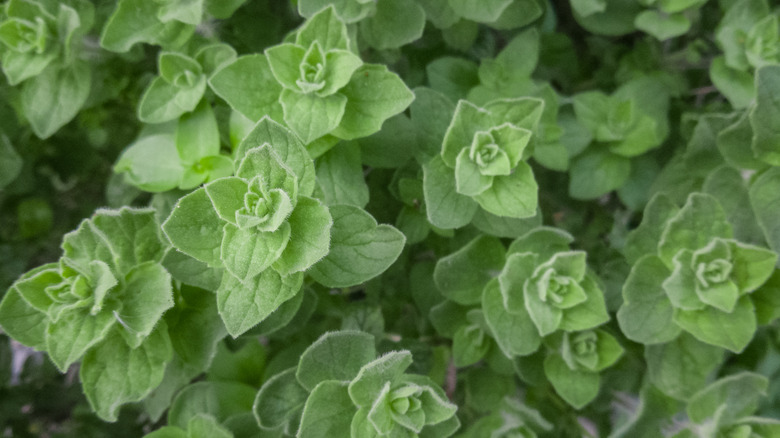The Unexpected Savory Herb That Makes A Refreshing Tea
Maybe you unwind with a cup of chamomile tea before bedtime. Maybe you swear by a hot cup of lemongrass and ginger tea when you start getting sick. However you enjoy it, herbal tea is a formidable part of the tea scene. Step aside, chai. Despite not having any caffeine content (per Livestrong), herbal teas are anything but boring. Rosehip tea boasts a vivid floral, botanical flavor. Sipping a hot cup of peppermint tea can be a cooling palette brightener and after-dinner digestif, reports the BBC. There are even herbal dessert teas like this dark chocolate one by Teecino that can help satisfy a sweet tooth craving.
Still, some of the more tragically-overlooked teas are savory ones. Tulsi Holy Basil and earthy red rooibos are warming, non-sweet herbal teas that get the job done. If black teas are your thing, Chinese smoked lapsang souchong is about as savory as it gets. Today, we're deep-diving into one particular savory herb that makes a refreshing tea, and it might be a little unexpected. Introducing: Greek oregano.
Give Greek oregano tea a try
Greek oregano or Origanum vulgare is called rigani in the original language, via The Spruce Eats. And according to Greek food purveyor Kardamas, Greece is world-famous for its high-grade oregano, which is sold both fresh and dried. It's a staple herb for Mediterranean and Italian cuisines, and it's also a rich source of iron, calcium, magnesium, and vitamins A, C, and K. Per the Greek farm Tofillo, folks have been enjoying Greek oregano tea for more than 4,000 years. The legend goes that the ancient Greek goddess Aphrodite grew oregano in her garden on Mount Olympus as a symbol of happiness and joy.
The taste is warm, slightly sour, earthy, and savory with a kick of spice — an herbal flavor that cries out to be brewed. To make a killer cup of Greek Oregano tea, Kardamas says to steep one tablespoon of dried leaves in one cup of boiled hot water. Allow them to steep for 5-10 minutes, depending on how strong of an herbal flavor you prefer, then strain and enjoy. If you're using Greek oregano straight from the stalk Dáfni Greek Products suggests breaking it off into six to eight pieces, roughly two inches long in total. as the stalks, leaves, and stems can all be steeped.
To complete the meal, served with kalamata olives, crusty bread, and feta cheese. Per The Spruce Eats, Greek culinary stylings often use Greek oregano with egg dishes, tomato sauces, zucchini, and seafood, so feel free to get creative with your tea snacks.

